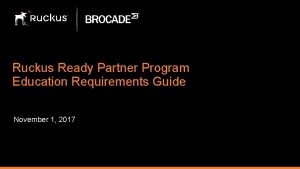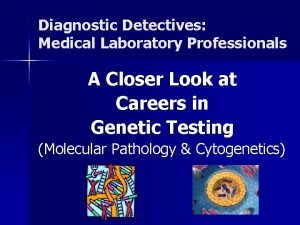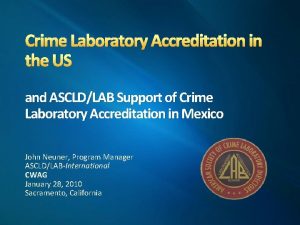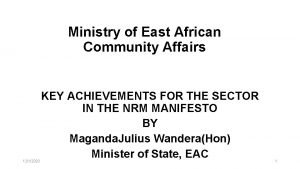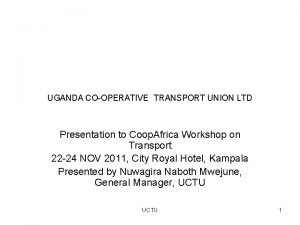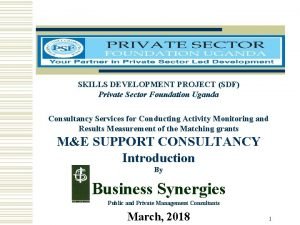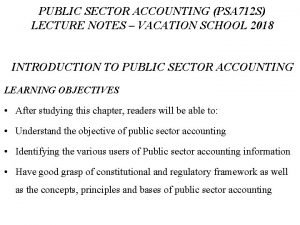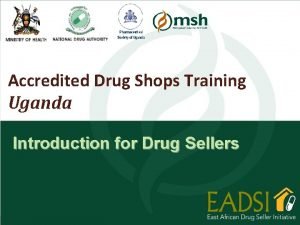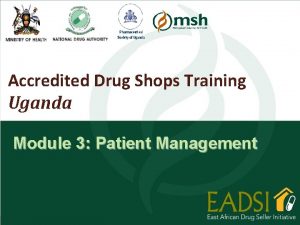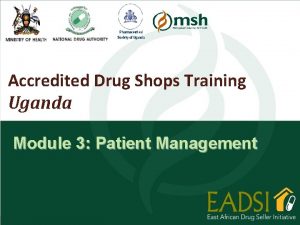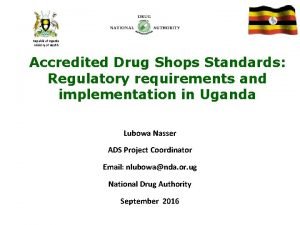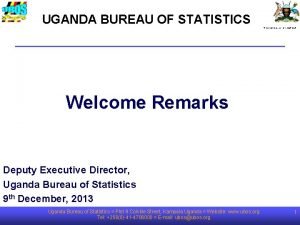Accredited Drug Shops Training Uganda Introduction for Drug








































- Slides: 40

Accredited Drug Shops Training Uganda Introduction for Drug Sellers 1

Why don’t individuals manage medicines optimally? manage medicines optimally § Don’t have access to health providers § Don’t have access to medicines § Medicines accessible are not of good quality § Can’t afford to pay for medicines § Don’t know how to take medicines properly § Too cumbersome to take medicines properly § Medicines cause troublesome side-effects § Don’t believe medicines will work § Competing interests… just forget! § Many, many more reasons… 2

Why don’t governments manage medicines optimally? § Not enough access to providers to prescribe/dispense § Products are not available, or are not of good quality or are not appropriate for health needs § Can’t afford to procure medicines § Don’t know how medicines should be used § Don’t know how to implement medicines management systems § Don’t believe that systems can improve § Competing interests… food, water, safety! § Many, many more reasons… 3

How does this relate to drug sellers? § More than 60% of the Ugandan population seeks medicines from the private sector § In rural settings, Class C drug shops are often the only accessible source of medicines, but… § Previous surveys and inspections have shown that: § Many drug shops do not meet minimum requirements for sanitary and appropriate drug storage § Many drug sellers have not had adequate training in safe medicines handling, dispensing and use § By necessity, drug shops frequently stock/dispense items beyond their current legal scope § Registration, supervision and regulation of drug sellers has been inadequate 4

What can be done about this? § The National Drug Authority (NDA) of Uganda in partnership with the Pharmaceutical Society of Uganda (PSU) and Management Sciences for Health (MSH) have developed a training and certification program to help drug sellers learn more about how to better store, dispense and advise patients on medicines. § Class C Drug Shops in the Kibale region that meet specific criteria will be eligible to be accredited to dispense an enhanced list of medicines approved by NDA. § § Achieving physical standards (passing inspection) Completing the training component (passing the examination), and Adopting the approved code of ethics Once accredited, the Class C Shops will be called Accredited Drug Shops (ADS) which will be promoted to the public 5

What can be done about this? (2) § To qualify, Class C Drug Shops will have to— § Achieve physical standards (passing inspection) § Complete the training component (and pass the examination) § Adopt the approved code of ethics § Once accredited, the Class C Shops will be called Accredited Drug Shops (ADS) which will be promoted to the public. 6

Is this program only for Kibale? § The ADS concept is being piloted first in the Kibale region. § After a reasonable period of implementation, the outcomes in the Kibale region will be compared to those of the Mpigi region (where drug sellers will not undergo training). § If the results of this pilot are favorable: § § § Access to medicines improves Storage of medicines improves Dispensing of medicines improves Use of medicines improves Corruption decreases § If successful, the government may decide to expand the project to other regions. 7

Why do we think the program will work? § The Ugandan ADS concept was adapted from the Accredited Drug Distribution Outlet (ADDO) program that has been very successful in Tanzania. § We have learned from the Tanzanian experience but have created a model that is specific for the needs and situation in Uganda. § Drug sellers are very important people in their communities and we think that they want to do an even better job in taking care of people. § Many stakeholders (e. g. , the NDA, the PSU, NGOs like MSH, training institutions and drug sellers) have been consulted regarding the need for this program and to advise in the development of the training. 8

What will the training entail? § The ADS training will occur over several weeks during the period of July 6 th – August 29 th. § Both drug sellers and owners will be trained on an alternating basis to allow the drug shops to remain open during the training period. § General topics will include: § Module 1: Laws, Regulations and Ethics § Module 2: Medicines Management § Module 3: Patient Management § Module 4: Case Management § Module 5: Business Management and Financing (owners only) 9

Training Goals § The training is designed to enhance the capacity of drug sellers to appropriately organize and operate a pharmaceutical services delivery point. § This includes competency in: § § § § § Evaluating, managing and referring patients Reading, interpreting, and labeling prescriptions Dispensing medicines Communicating with patients and counseling them on optimal medicines use Providing first aid Complying with regulations and keeping required legal records Managing medicines inventory Storing medicines Demonstrating professional conduct and health-related ethics 10

Training Resources § ADS Manual § ADS handouts § ADS references § § Uganda Clinical Guidelines Malaria Guidelines Job aids Other 11

Accredited Drug Shops Training Uganda Module 1: Law, Regulations and Ethics 12

Module Outline § Introduction to the Accredited Drug Shop (ADS) model § The pharmaceutical sector of Uganda § The ADS concept § Position of drug sellers in service delivery § Legal requirements and standards for ADS § ADS Code of Ethics and Conduct 13

Introduction to the ADS Model Aim To understand the Pharmaceutical Sector in Uganda and the role of the Accredited Drug Shops (ADS) in improving use of medicines in areas underserved in Pharmaceutical services. 14

Objectives § Outline the pharmaceutical sector of Uganda § Understand the ADS concept § Discuss the role of ADS in service delivery 15

Pharmaceutical Sector of Uganda The Pharmaceutical Sector § Uganda is divided into more 84 districts § To serve these districts, the public health-care system is structured in the following way: § Two national referral hospitals: Mulago and Butabika § Eleven regional referral hospitals which also act as District Hospitals in the areas where they are located § Several health centre II, III and IV. § Mulago and Mbarara Hospitals are also University Teaching Hospitals 16

The Public Healthcare System Administrative Structure Local Council Level Health Structure Village I HC 1 Parish II HC 2 Sub-County III HC 3 County/Sub-District IV HC 4 District V District/General Hospital Regional Referral National Referral 17

The Public Healthcare System (2) § The public pharmaceutical sector follows a similar format, but only 49% of the population accesses medicines through the public system. § Rural communities are particularly affected because they have to walk long distances to access the services. Therefore, Public. Private Partnerships are important and ADS is a step towards such an attempt. § The ADS project seeks to build capacity of the private for-profit medicine dispensing shops/outlets to appropriately manage diseases that are most prevalent in areas where they are located. 18

The Medicines Supply System § Medicine supply system is run by both private and public sectors. § National Medical Stores (NMS) provides medicines for public sector. § Joint Medical Stores (JMS) is a nonprofit organization that supplies medicines to NGOs, faith-based organizations. § Local manufacturers and wholesalers/importers are major sources for the private pharmacies and Drug Shops. § Summary of the medicine supply sources: § § § Large scale manufacturers Small scale manufacturers Public Sector health facilities Private Pharmacies Drug shops 5 5 2, 939 300 2600 19

How do medicines reach the final users? Levels Private Sector Public Sector International Suppliers/Manufacturers Procurement Agencies National JMS/Local Manufacturers NMS Regional Wholesalers/Importers Regional Hospital District Wholesale and Retail Pharmacies, ADS, Drug Shops District Hospital Health Sub-District Community HC II, HC IV Community Medicine USERS 20

The ADS Concept § An ADS is a special category of class C drug shop that is accredited by the NDA and allowed to stock medicines that are generally not allowed in an ordinary Class C drug shop. § ADS will be promoted to the public as safe and good quality sources of medicines. 21

Why are ADS needed in Uganda? § To improve medicines availability § Essential medicines available in all drug shops § To improve care provided in the community § Malaria care § Childhood diarrhoea care § Wound/burn dressings and treatment § To reduce inappropriate practices § Prescribing antibiotics for respiratory, urinary and sexual infections § Injecting medicines when tablets are safer and equally effective § Poor storage of medicines § Untidyness § Dumping of expired medicines 22

Benefits of ADS § ADS will be allowed to stock medicines and other healthrelated commodities beyond what is generally allowed by ordinary Class C drug shops. § This expanded list of drugs covers the most prevalent diseases in the communities. § Drug sellers and owners will be trained in business management, medicine management and patient care. § There will be a public awareness campaign so that patients will know that ADS provide good care and are a good place to seek help. § There will be support supervision and regular monitoring. 23

Conditions for Accreditation § The seller must satisfy all the conditions indicated for licensing a Class C drug shop. § The seller must have attained UCE certificate, and have a minimum of six months training of nursing assistant course § In addition to the usual requirements for a Class C shop — § The seller in an ADS must complete the ADS training program and pass an examination. § The shop itself must pass an inspection. 24

Conditions for Licensing a Class C Drug Shop § The person licensed to carry out the business should have a medical background, e. g. , nurses, midwives. § The applicant must have certification from the local authorities. § Premises should satisfy the requirements for suitability, such as: § Must be a permanent structure. § Shall not be shared with any other business. § Premises should be built so that medicines are protected against conditions such as sunlight, rain, excessive heat. § A Class C drug shop must keep proper records of all shop transactions, and will allow inspection by NDA or a police officer. 25

ADS Accreditation Process 1. Obtain application forms for accreditation (from DADI or PDSA). 2. Submit completed forms (to DADI or PDSA). 3. Wait for NDA Inspection (done by DADI in presence of EADSI). 4. Inspection report is sent to Regional Drug Inspector for NDA approval. 5. Successful applicants will be issued Accreditation Certificates, deeming them fit to operate as ADS. NB: Accreditation will only be given for business to be carried out in an area that is not sufficiently served by existing retail pharmacies. 26

Regulation of ADS § Regulatory bodies involved include PSU, NDA and other players (e. g. , PDSA and Local Authorities). § Role of PSU: § Personnel accreditation training § Support supervision § Sets the standards of Conduct and Ethics, and ensures that they are met 27

Regulation of ADS (2) Role of NDA: § Handles development and regulation of pharmacies and drug shops in the country § Approves the national list of essential drugs and revises it as needed § Estimates medicine needs to ensure the needs are met as economically as possible § Controls imports, exportation, and sale of pharmaceuticals § Controls medicine quality § Promotes local medicine production § Encourage research and development of herbal medicines § Promote the rational use of drugs through training 28

Self Regulation § PDSA, with the assistance from PSU, will provide the framework for self-monitoring and develop a supervision program that will help the association to monitor its members. § Self regulation will allow members of the PDSA to manage their own affairs, including managing their own performance. § A team comprising sub-county health assistants, county health inspectors and representatives from the PDSA shall regularly visit the ADS at least every two months using the checklists developed. 29

Regular Monitoring and Support Supervision § The objectives are: § To ensure that the ADS sellers and owners perform and conform to the regulatory guidelines , and § To provide onsite support and mentoring. § The team will include: § In-charge from a HC III § PSU § A representative of the PDSA at sub-county level. This team shall make quarterly supervisions using a standard checklist and will be trained to supervise and write reports. 30

Procedures for Routine Support Supervision § The supervision team will: § Inform owners and drug sellers about the activity § Notify the local authorities about the impending inspection exercise before starting § Visit each outlet and assess the premises, stock management and dispensing practices using supervision checklist § Share findings with drug sellers and owner § Provide on-site practical training, orientation and mentoring 31

Standards for Operating ADS A standard refers to a level of quality or a specified level of quality will be measures. Services will be considered to be of poor quality if they are perceived to fall below the stipulated standard. § Standards for Personnel: Qualification, code of conduct, dress code, commitment letters, training § Standards for Premises § Standards for Dispensing: Dispensing procedure, counselling of patients, dispensing containers, labels, sources of supply, storage and hygiene § Standards for Record Keeping and Documentation: Purchase record, Rx books, expiry record book, sales record, inspectors’ record book 32

Offences and Penalties § Any person who contravenes any provisions of these standards commits an offense and shall be liable upon conviction to a fine and/or to imprisonment specified under the National Drug Authority Act, 1993. Under this, the violator may be subjected to appear before a court of law and, upon conviction, may be punished by either paying a fine or be imprisoned or both. § Examples of offences include: § Selling expired medicines or medicines outside the ADS extended medicines list § Purchasing medicines from non-licensed dealers § Dispensing medicines purchased from unauthorized dealers § Illegally opening an ADS § Not paying officially assessed business taxes 33

Relationship of Laws to Ethics § Ethical values and legal principles are closely related. § The law often embodies ethical principles, but laws do not always prohibit actions that would be considered unethical. § Lying or betraying the confidence of a friend is not illegal, but most people would consider it unethical. § Driving too fast is illegal, but many people do not have an ethical conflict with exceeding the speed limit. 34

Code of Ethics & Conduct Professionalism: Professionalism is what one exhibits in terms of attitudes, behaviour, and skills while performing duties, and responsibilities expected of him or her by the community by virtue of having privileged knowledge and skills acquired through a unique and formal education. What is expected of a Professional Health Worker? § § § Attend to the patient’s best interest rather than self interest Be accountable to the patient and society Commit to regularly updating knowledge Be available and respond when called upon Be fair, truthful, & straight forward when interacting with the patient Be respectful to patients and their families 35

Example Ethical Violations in Medicines Management § Fraud § Theft § Bribery (Kintukidogo) § Threats § Nepotism Note that some of these ETHICAL violations are also ILLEGAL. § Favoritism § Lack of transparency 36

Ethical Decision Making § In deciding on a course of action, ask yourself: § Is it right? Is it legal? Does it reflect professional values? § How will I explain my decision to others? § How will it look to others? § What will the consequences be? § Who else will be affected by my decision? 37

The ADS Personnel Code of Ethics and Conduct § § § § § Honesty and integrity Patient care Special relationship with patients Confidentiality Do not condone low quality medical service Collaborate with other health workers Be responsible for assuring and improving competence Owners not to require sellers to act illegally Health promotion No commercial relation to be allowed 38

Resources to Review § Readings: § § § Pharmacy and Drugs Act, 1970 National Drug Authority and Policy Act ADS survey/pre-inspection reports ADS accreditation criteria/checklist ADS standard of practice ADS (expanded) list of medicines 39

Conclusions § We hope that we have empowered you to provide better health services to our communities, with the elements of the ADS concept in mind. § We urge you all to abide by the ADS Code of Ethics and Conduct while executing your duties. 40
 Is berkeley extension accredited
Is berkeley extension accredited Teta accredited providers list
Teta accredited providers list Ruckus certification training
Ruckus certification training Esma accredited laboratories
Esma accredited laboratories Republic act 10912
Republic act 10912 Is old dominion university accredited
Is old dominion university accredited Aapl accredited schools
Aapl accredited schools Naacls accredited cytogenetics education program
Naacls accredited cytogenetics education program Bosch abc contractor
Bosch abc contractor Oshs rule 1070
Oshs rule 1070 Accredited organization
Accredited organization What does it mean to be naeyc accredited
What does it mean to be naeyc accredited Ascld lab
Ascld lab Gil fried
Gil fried Nche uganda
Nche uganda Sinotrans subsidiaries
Sinotrans subsidiaries Ministry of east african community affairs uganda
Ministry of east african community affairs uganda Kakugu
Kakugu Islamic microfinance in uganda
Islamic microfinance in uganda Malaria in uganda facts
Malaria in uganda facts Uganda cooperative transport union limited
Uganda cooperative transport union limited Sdgca
Sdgca Uganda skills development project
Uganda skills development project Public sector accounting definition
Public sector accounting definition Community policing in uganda
Community policing in uganda Uganda aids rate
Uganda aids rate Burmese tiger pit
Burmese tiger pit Examples of class c drugs in uganda
Examples of class c drugs in uganda Tea growing in uganda
Tea growing in uganda Challenges of budget implementation in uganda
Challenges of budget implementation in uganda Uganda red cross society headquarters kampala
Uganda red cross society headquarters kampala Kajmansi vs canada
Kajmansi vs canada East african tea trade association
East african tea trade association Shops in britain
Shops in britain Kinds of shops
Kinds of shops Shops and shopping vocabulary
Shops and shopping vocabulary Shops and commercial establishment act
Shops and commercial establishment act Sentences with countable and uncountable nouns
Sentences with countable and uncountable nouns Floral shops bookstores and farms are examples of
Floral shops bookstores and farms are examples of Wise trading dutyfree shops
Wise trading dutyfree shops Objective of flowers
Objective of flowers


